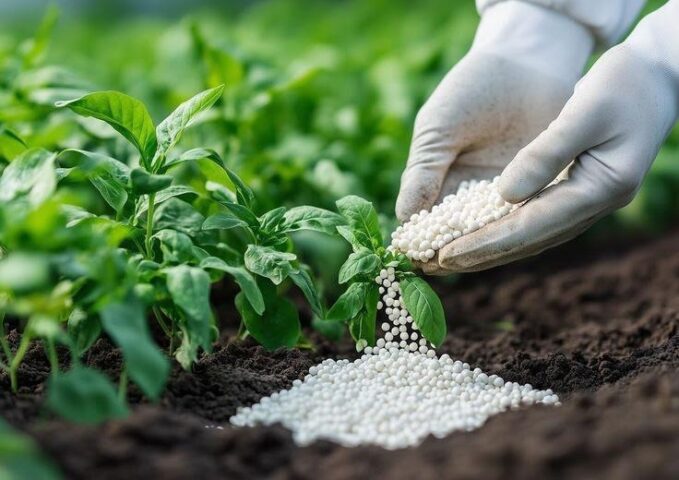Supported by ICAR and international studies, SafeRock® delivers up to 30% higher yields with 25% less nitrogen use
New Delhi: With Indian soils facing rapid nutrient depletion, SafeRock® Minerals offers a sustainable, research-driven solution that boosts yields, cuts fertilizer use, and supports India’s vision for resilient, regenerative farming.
A Growing Crisis Beneath the Surface
India’s Green Revolution ensured food security but also left a legacy of ecological imbalance. Decades of excessive chemical fertilizer use—particularly urea—have stripped soils of organic carbon, reduced microbial activity, and weakened nutrient retention. According to the Indian Council of Agricultural Research (ICAR), nearly 40% of Indian farmland now faces moderate to severe nutrient deficiency, while over 30% of cultivated soils show declining productivity and structural degradation.
Meanwhile, India’s dependency on imported fertilizers makes the sector highly sensitive to global price fluctuations.
The sharp rise in fertilizer costs after 2022 severely impacted small and marginal farmers. Sustainable soil rejuvenation, therefore, is no longer optional—it’s a national priority.
The Science Behind SafeRock® Minerals
SafeRock® Minerals, derived from natural silicate rock, functions as a long-lasting soil amendment rather than a conventional fertilizer. Its structure, rich in calcium, magnesium, potassium, and trace elements, enhances the soil’s cation exchange capacity (CEC)—allowing it to store and release nutrients more efficiently.
Unlike quick-release fertilizers, SafeRock® works by slowly releasing essential nutrients, improving the efficiency of nitrogen, phosphorus, and potassium use. This process reduces leaching losses, improves microbial activity, and helps soils maintain moisture balance—vital for regions affected by erratic rainfall.
Studies conducted by the ICAR-Indian Agricultural Research Institute (IARI), Krishi Vigyan Kendras (KVKs), and international institutions such as Clemson University (USA) and Vietnam’s Government Research Program for Dragon Fruit Development (2018–19) have validated SafeRock®’s performance across diverse crops and soil types.
At Clemson University’s Edisto Research Centre in South Carolina, SafeRock® increased processing tomato yields by 28% when applied at 75 kg/ha with standard NPK doses. Notably, the same yield was achieved with 20% less nitrogen input, demonstrating significant fertilizer savings. Similarly, Vietnam’s trials showed that a single SafeRock® application led to 30% less nitrogen use but over 50% higher yields in tropical fruits—results that hold strong relevance for India’s mango, citrus, and guava industries.
In India, a 2014–15 wheat trial at Krishi Vigyan Kendra, Sirmour (Himachal Pradesh), under ICAR-IARI supervision, found 20.7% higher grain yield in SafeRock®-treated fields. Soil organic carbon increased from 0.29% to 0.41%, while available calcium and magnesium nearly doubled. The treated grains contained 20–65% more essential nutrients, including nitrogen, phosphorus, calcium, and sulfur—enhancing both nutritional and commercial value.
Further, a 2016–17 ICAR-IARI rice–wheat rotation study led by Dr. Y.V. Singh, Principal Scientist, Division of Microbiology, demonstrated remarkable nutrient uptake gains: rice nitrogen absorption increased 40–47%, phosphorus 60–70%, and potassium 44–53%. Wheat yields rose 10–13%, and protein content improved by 27%, while microbial enzyme activity grew 15–95%—all achieved with a 25% fertilizer reduction. These findings were later detailed in the Indian Journal of Agricultural Sciences (2019), establishing SafeRock®’s compatibility with India’s key cereal systems.
*Globally Certified and Scientifically Endorsed*
Adding to its credibility, SafeRock® earned the EU Type Examination Certificate under the 2019/1009 Fertilising Products Regulation (FPR) in August 2024, valid through 2029. This certification, issued by STICHTING EFCI Register, officially designates SafeRock® as a compliant inorganic soil improver eligible for CE marking across the European Union.
Such global recognition is rare for mineral amendments entering developing markets. The certification guarantees adherence to stringent EU safety, efficacy, and environmental standards—assuring Indian farmers of product integrity and long-term soil compatibility.
Domestically, the product’s micronized evolution, Pomerite®, was verified by ICAR-IARI in November 2024, with a confirmation letter from Dr. Y.V. Singh affirming it as the refined, finer-particle version of SafeRock®. This form enhances nutrient release and is adaptable for foliar sprays, fertigation systems, and seed coatings. The same IARI research team confirmed that the earlier rice–wheat trial data directly applies to Pomerite®, with an additional 10–15% performance improvement.
Aligned with India’s Sustainability and Policy Goals
By reducing nitrogen dependency and improving soil fertility, SafeRock® aligns perfectly with the objectives of India’s Soil Health Card Scheme, Paramparagat Krishi Vikas Yojana (PKVY), and National Mission on Sustainable Agriculture (NMSA). It directly supports the country’s Nationally Determined Contributions (NDCs) under the Paris Agreement, which call for emission intensity reduction and climate-resilient farming.
The product’s contribution to lowering greenhouse gas emissions—by curbing nitrous oxide output from fertilizer overuse—also complements initiatives like the National Action Plan on Climate Change (NAPCC). Furthermore, its proven ability to reduce nitrate leaching offers a safeguard against groundwater contamination, a major concern across Punjab, Haryana, and Uttar Pradesh.
A Transformational Opportunity for Indian Farmers
For farmers, the benefits extend beyond sustainability. Field economics show that SafeRock® use can yield ₹1,000–₹1,600 additional revenue per acre, while simultaneously cutting fertilizer costs by 20–25%. Over time, the cumulative impact on soil health translates into better resilience, reduced dependency on subsidies, and higher profit margins.
When integrated with government-backed schemes like PM-KISAN, SafeRock® can scale nationwide as a complementary input that improves productivity without demanding major practice changes from farmers. Its compatibility with both organic and conventional systems makes it a rare bridge between scientific innovation and field practicality.
Looking Ahead
As India advances toward climate-smart, high-efficiency agriculture, solutions like SafeRock® Minerals represent the scientific backbone of that transition. With robust validation from ICAR, international research partnerships, and the EU FPR certification, SafeRock® is more than a product—it is a global benchmark for sustainable soil enhancement adapted to Indian needs.
Its track record—spanning increased yields, improved nutrient balance, lower fertilizer dependency, and verified environmental safety—positions it as one of the most promising tools for India’s future food security. By investing in mineral-based soil restoration today, the nation can lay the foundation for an agriculture sector that is not only more productive but also more resilient, regenerative, and globally competitive.
